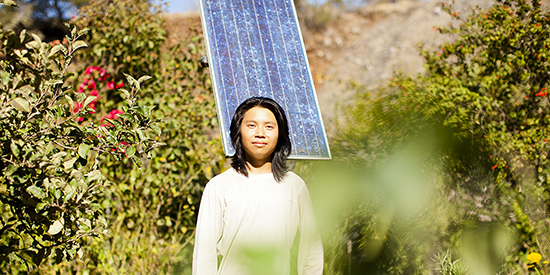Become a climate champion with Bending the Curve
Share This Article

What do a Nobel laureate, Pulitzer Prize author and composer, MacArthur fellow, Pope Francis’ advisors and dozens of UC faculty and staff have in common? They’ve all helped develop Bending the Curve, a multi-faceted climate education project. The project goal is to create one million climate warriors by inspiring course participants to make simple but high-impact green choices in their everyday lives, and to share these actions with their communities. Participants learn how everyone — individuals, communities, businesses and religious leaders — can help bend the curve of climate change towards a more sustainable future.
Listen to UC San Diego Prof. Veerabhadran Ramanathan and students who have taken the course explain more in this introductory video.
Anyone can enroll in “Bending the Curve” and audit courses for free. To take instruction further, you can pay $49 per course ($196 for the series) to access assessment activities and earn a UC San Diego certificate of accomplishment upon successful completion. Learn more and enroll at bendingthecurve.ucsd.edu.
Inspired by UC’s commitment to lead the way
In November 2013, UC announced the Carbon Neutrality Initiative (CNI), which committed the university to emitting net zero greenhouse gases from its buildings and vehicle fleet by 2025. Building on UC’s pioneering work on climate research and furthering its leadership on sustainable business practices, the CNI was an ambitious announcement; no other major university system had made a similar commitment. Two years later, the UC Climate Solutions Group — composed of 50 top experts from all 10 UC campuses and the associated national laboratories — released “Bending the Curve,” a report that outlined 10 scalable solutions for moving the world towards carbon neutrality, a practical framework outlining immediate and long-term actions for staving off catastrophic climate change. In 2018, “Bending the Curve” inspired a 2018 undergraduate course at UC San Diego, which then became the catalyst for the multi-campus, interdisciplinary Bending the Curve Education Protocol.
Twenty-five UC faculty members partnered with UC’s Innovative Learning Technology Initiative (ILTI) to create the Bending the Curve Education Protocol with funding from UC and the Gates Foundation. Today, it has four components: The first is a hybrid online/in-person course, which is now taught at all UC campuses and is licensed to five other universities, including Stockholm University and National Taiwan University. Next is a solely online UC course, which allows an instructor on one UC campus to instruct students at any of the university’s undergraduate campuses. Third is an open-source Bending the Curve textbook — authored by the lecturers of the course, published by the University of California Press and funded by the Gates Foundation — which is available for download through the California Digital Library. And fourth is the massive open online course (MOOC), which was launched in late May by UC San Diego Extension in partnership with UC San Diego Digital Learning and UCOP’s ILTI.
As Prof. Ramanathan said upon the MOOC launch, “This indeed took a village to make happen; in particular, collaboration by 50 faculty from all 10 UC campuses, digital learning technology innovators and educators at the Office of the President and UC San Diego and the professional video production team at UC San Diego and other campuses. I am indebted to all of you.”
Bringing climate change solutions to a global audience
The MOOC version of Bending the Curve will allow UC to deliver its industry-leading knowledge of climate change with a broad global audience for the first time. Anyone who is interested in learning more about climate change, its impact and their individual potential to combat it can sign up to learn from 25 experts in climate science, social science, public health, policy, economics, energy technologies, super pollutants and ecosystem management from across the UC system and elsewhere. It is an unprecedented opportunity to share UC research with the world at large.
“[Bending the Curve’s] uniqueness is addressing the interconnectedness of the problem and how all of society including faith communities have to come together to address this crisis,” says Ramanathan. “The course lectures also address the inter-generational and intra-generational equity and ethical issues bringing in vividly the plight of the world’s 3 billion or more vulnerable people.”
Read an article with more information about the goals for the Bending the Curve MOOC and enroll today at bendingthecurve.ucsd.edu.
